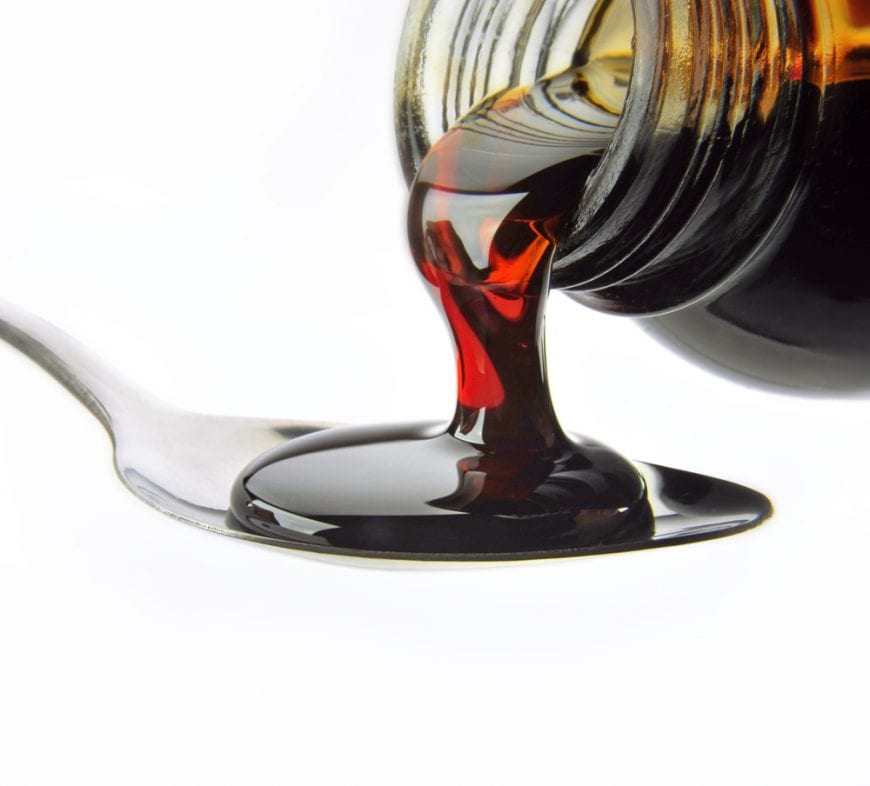Cannabis has no dangerous side effects. These meds do.
Are over the counter drugs more dangerous than cannabis? In short, more than likely. Of course, the level of “danger” depends on the active ingredient, but all over the counter (OTC) medication have more negative side effects than cannabis. Yet, we take these medicines all the time without a second thought.

Cough Syrup
Cough syrup is so common, you probably have some in your medicine cabinet right now. The couch suppressant, antihistamine, and decongestant properties come from the active ingredient Dextromethorphan. But in the wrong hands and in the wrong doses, cough syrup can be quite dangerous for your liver.
This issue has been particularly prevalent in teenagers for the ‘cheap’ and legal high. Taking it in high enough doses, Dextromethorphan creates euphoria and can cause hallucinations like those one would get from PCP. Additionally, cough syrup is addictive.
Tylenol
Tylenol is another key medicine that many people have in their house or purse. Its active ingredient is acetaminophen, which functions as a pain reliever. However, the effects on the liver and rest of your body, may not be worth it.
If you take too much Tylenol, you’re at risk for acute liver failure. In fact, Tylenol is one of the most common reasons for emergency room visits for accidental overdose. Current recommendations are that adults consume no more than 4000mg per day.
Patients using Tylenol are also warned not to consume alcohol since the medication interferes with your ability to process acetaminophen, leading to a toxic build up that damages the liver.
It is worth noting that many of the conditions that drugs like Tylenol treat can also be treated with cannabis. Try cannabis for your pain instead!
Epsom Salts
What’s a relaxing bath without a handful of Epsom salts and lavender? They ease the tension in sore muscles, and for ladies, helps kick nasty period cramps. But these salts have greater uses than as an addition to your bubble bath.
Epsom salt is safe for consumption in controlled doses. If they’re stirred into water and drank, the magnesium helps to eliminate stress and induce sleep. Some sufferers of fibromyalgia and arthritis also report that Epsom salts help to treat their pain symptoms. Finally, if you’ve got issues with digestion or constipation, Epsom salts help to move things along.
However, they come with side effects ranging from nausea, headaches, lightheadedness, and flushed skin to more severe consequences from too high of doses like coma, paralysis, heart problems, and sometimes death. You should never spend more than 30 minutes in an Epsom salt bath.

Midol
Midol is one of the go-to drugs for menstrual cramps and headaches, making it a staple in most women’s households. The active ingredient, acetaminophen, also works in fever reduction. But how safe is Midol really?
Well, since acetaminophen is the active ingredient in Midol, all of the above warnings for Tylenol also apply here. Young women are at particular risk for liver damage as they tend to pop the Midol (500mg acetaminophen per pill) beyond the recommended limit because it is perceived to be “safe” and short term. This puts women at a high risk for accidental overdose.
Cannabis can treat both period cramps and migraine/headache.
Aspirin
Aspirin has long been a household staple as treatment for headaches, general aches and pains, and according to doctors – a way to prevent heart attack/stroke. It thins blood, which makes it capable of causing overdose and a risk factor for excess bleeding fatalities. On top of that, doctors are now rethinking whether or not aspirin can actually prevent heart attack. Even worse, excess aspirin use can cause major gastrointestinal issues. The biggest gastrointestinal issue you can get from cannabis is excess hunger.
Why Not Try Cannabis?
In short, skip the over the counter drugs and their side effects, and go for cannabis. Its less dangerous than most pharmaceuticals, and what’s more, the stigma is rapidly disappearing. For a new consumer, vaping is probably the easiest method of administration (although the consumer would need a vaporizer). Smoking can be harsh on the lungs, but is an option with less barriers to entry. However, there are many methods of administration available.

